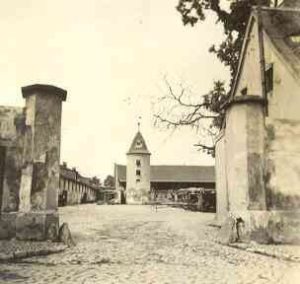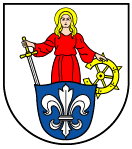Leafing through old traditions – stories from the homeland.
Retold by local chroniclers from Wolmirstedt.

Two hundred years ago, the people in our region experienced the “French period”, the events of which were described by Wolmirstedt deacon J.G.F. Freydank in his chronicle. It ended on May 6, 1814 with the withdrawal of French troops from the Magdeburg fortress and the town became Prussian again. Like Wolmirstedt, it belonged to the Duchy of Magdeburg of the Kingdom of Prussia until 1807, which was defeated by the troops of Emperor Napoleon Bonaparte at Jena and Auerstädt on October 14, 1806. In the subsequent peace treaty of Tilsit, it had to cede all of the left bank territories, along with other parts of its empire. Napoleon incorporated them into the newly founded Kingdom of Westphalia, which he transferred to his youngest brother Jero’me. Here Magdeburg became the seat of government of the Elbe department with a French garrison and Wolmirstedt had the status of a cantonal town in the Neuhaldensleben district of this department. In the course of the War of Liberation, the troops of the allies put Magdeburg in an isolated position in 1813 and the soldiers of the garrison frequently launched raids on villages in the Magdeburg area.
Junkerhof around 1930
For this reason, the inhabitants there suffered greatly from requisitioning and looting. Wolmirstedt was also affected. After a Russian Cossack detachment had already appeared here on May 10, 1813, Prussian Landwehr and cavalry occupied the town on December 16. In the early morning of the following day, it was attacked by the troops of the fortress and the Prussians had to give way to the superior forces after a short battle.
The French then plundered houses, farms and stables, but then had to retreat back to Magdeburg as a result of a counterattack by Prussian troops. The citizens suffered a loss of 16,000 thalers due to the theft of food supplies, livestock and property, and the widow of the Jersleben preacher Boether was shot dead by a looter in the former St. Katharinen Abbey on the church square. But this event in the war did not end its disastrous impact on Wolmirstedt. As Deacon Freydank noted, in January 1814 a malignant fever broke out among the Prussian troops billeted there. Military hospitals had to be set up on the Junkerhof estate and in the abbey, both of which were located between the present-day Burgstraße, Vogelstange, Julius-Bremer-Straße and Bahnhofstraße. The citizens of Wolmirstedt provided a great deal of support in caring for sick soldiers. Nevertheless, a large number of them fell victim to the epidemic and some of the helpers also became infected and died.






